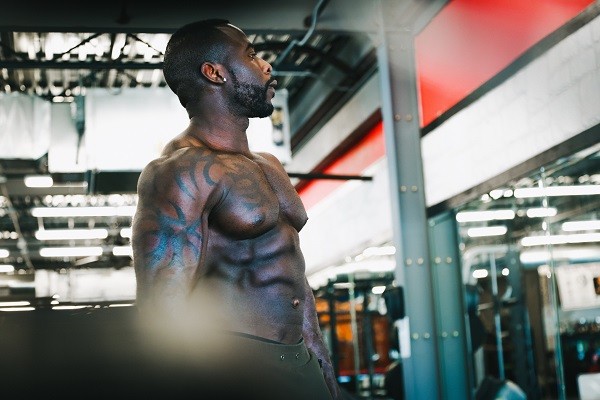What Is Our Natural Limit of Muscle Growth?

How long does it take to grow maximal muscle?
Scientists refer to the maximum amount of muscle we can grow as our "ceiling effect." So, when does this kick in?
If you're a male and just starting out, research has found you can gain 9-11 kilograms in the first 6-12 months of training, whilst women can gain roughly half of this. These are referred to as "newbie gains", which sadly don't last forever.
These rapid newbie gains in muscle are due to prolonged levels of muscle protein synthesis. After a novice finishes a workout, they are still building muscle a whopping 50 hours after training! For a comparison (in the same study) muscle protein synthesis stopped at the 36-hour mark for experienced lifters.
The aforementioned cited studies suggest that when you enter your second year of lifting, you can gain around half the muscle you earned in your first year, and about half of that again in year three.
But when does it stop?
Well, leading researchers have said there is no bullet-proof scientific evidence for the real upper limit of natural muscle growth; we don't know exactly what or when that is. But we know it does slow down significantly. Recapping:
First 6-12 months: Men can gain 9-11 kilograms of muscle, women about half of this.
Second-year of lifting: You can gain half the amount you gained in your first year
Third-year of lifting: You can gain half of what you gained in your second year
Why keep lifting weights if there is a ceiling?
Well, take a look around at the gym next time, there are many who keep training after many years and are still making strength gains, which can then, in turn, lead to more muscle growth.
Moreover, we have to keep lifting weights in order to maintain the muscle we've built.
Sadly, muscle gains are like grass -- we can't mow it and fertilise it solidly for 6 months and then expect the front yard to look good forever!
But we can still gain a small amount of muscle too, it just might not be that noticeable year to year.

But a lifelong approach to resistance training is a long-term investment: after 5-10 years the results will always be visible, which leads us to the next critical point:
Lifetime weight lifting for mental wellbeing
Perhaps more important than how we look, is how resistance training improves our mental health, and helps us prevent disease, as outlined in this previous article: "Why exercise is so important".
Recapping that:
- It results in an improvement in dealing with stress, anxiety, depression, and cognitive impairments
- It results in an improvement in self esteem
- It results in an improvement in self-efficacy
Protein intake for maximal muscle growth
It's one thing to be unsettled by a ceiling effect of muscle growth, but the truth is, the average gym-goer never realises that anyway because they don't commit for that long. It might take 7-10 years of consistent training, so it's nothing to be disheartened by.
Moreover, ensuring you get enough protein is critical and often overlooked. Current research suggests getting ~1.6-2.2 grams of protein per kilogram of body weight per day.
One thing people often struggle with is maximising their protein intake and getting enough from just their daily meals, which is when supplements help to play an important role for muscle growth. Alongside protein, BCCAs and creatine are some of the best supplements for muscle growth.

The bottom line is that muscle growth will halt significantly the longer you've been training. Just how much that might be could vary between individuals, but in the first 6-12 months, men can gain 9-11 kilograms of muscle and women about half of this. In the second year of lifting, you can gain half of the muscle gained in the first year, and in the third year, half of the previous year.
But resistance training shouldn't just be about muscle growth, given the other health benefits involved, including (and not limited to) an improvement in dealing with stress, anxiety, depression, cognitive impairments, and improving your self-esteem and self-efficacy.
References:
- Grgic J, Schoenfeld BJ, Davies TB, Lazinica B, Krieger JW, Pedisic Z. Effect of Resistance Training Frequency on Gains in Muscular Strength: A Systematic Review and Meta-Analysis. Sports Med. 2018 May;48(5):1207-1220. doi: 10.1007/s40279-018-0872-x. PMID: 29470825.
- Schoenfeld BJ, Contreras B, Krieger J, et al. Resistance Training Volume Enhances Muscle Hypertrophy but Not Strength in Trained Men. Med Sci Sports Exerc. 2019;51(1):94-103. doi:10.1249/MSS.0000000000001764
- Schoenfeld BJ. The mechanisms of muscle hypertrophy and their application to resistance training. J Strength Cond Res. 2010 Oct;24(10):2857-72. doi: 10.1519/JSC.0b013e3181e840f3. PMID: 20847704.
- Stokes T, Hector AJ, Morton RW, McGlory C, Phillips SM. Recent Perspectives Regarding the Role of Dietary Protein for the Promotion of Muscle Hypertrophy with Resistance Exercise Training. Nutrients. 2018;10(2):180. Published 2018 Feb 7. doi:10.3390/nu10020180















































